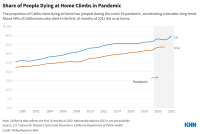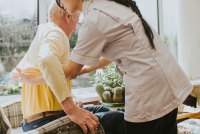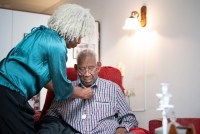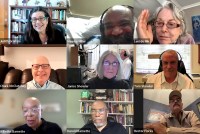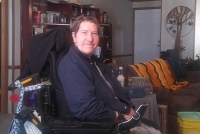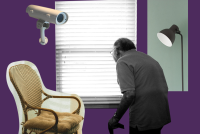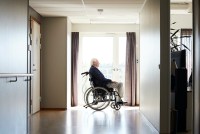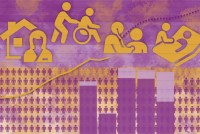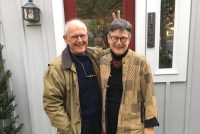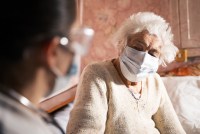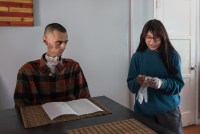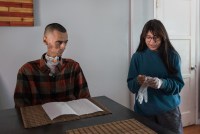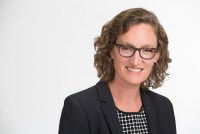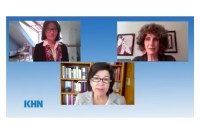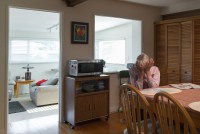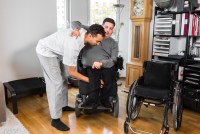Latest KFF Health News Stories
More Californians Are Dying at Home. Another Covid ‘New Normal’?
The proportion of Californians dying at home, rather than in a hospital or nursing home, accelerated during the pandemic, a trend that has outlasted the rigid lockdowns linked to the initial shift.
To Attract In-Home Caregivers, California Offers Paid Training — And Self-Care
Turnover ails a program that allows low-income people who are older or disabled to age in place. To attract new workers and improve retention, the state is paying caregivers to develop new skills.
Family Caregivers Find Support on #dementia TikTok
The TikTok hashtag “dementia” has billions of views. Caregivers of people with Alzheimer’s and other dementias have been using the site to swap tips and share the burdens of life with dementia.
To Families’ Dismay, Biden Nursing Home Reform Doesn’t View Them as Essential Caregivers
Relatives who often provide vital caregiving for nursing home residents say the lockdowns during the covid pandemic showed the need for family members to visit in person with their loved ones. About a dozen states have passed laws guaranteeing that right, and California is considering one.
Watch: Seniors Share How They’ve Made It Through the Pandemic
Nine seniors from across the country talk frankly about feeling alone and constrained, missing church, and family routines. They also share newfound hope and discoveries that arose from the crisis.
Pandemic-Fueled Shortages of Home Health Workers Strand Patients Without Necessary Care
Home health and hospice agencies are experiencing extreme worker shortages, which means they can’t provide services to all the patients seeking care.
When the Eye on Older Patients Is a Camera
High-tech tools ease caregivers’ stress but can raise sticky privacy questions and concerns about cost.
3 States Limit Nursing Home Profits in Bid to Improve Care
Following the devastating impact of covid-19 on nursing homes, state lawmakers want to be sure that government and private payments primarily go to improve care and staffing.
The number of Americans 65 and older is expected to nearly double in the next 40 years. Finding a way to provide and pay for the long-term health services they need won’t be easy.
Aiding Her Dying Husband, a Geriatrician Learns the Emotional and Physical Toll of Caregiving
When the covid pandemic hit, Dr. Rebecca Elon was thrust into a new role, primary caregiver for her severely ill husband and her elderly mother. “Reading about caregiving of this kind was one thing. Experiencing it was entirely different,” she says.
Biden Seeks $400 Billion to Buttress Long-Term Care. A Look at What’s at Stake.
Long-term care options are expensive and often out of reach for seniors and people with disabilities. The president has proposed a massive infusion of federal funding for home and community-based health services that advocates say will go a long way toward helping individuals and families.
KHN’s ‘What the Health?’: Health Care as Infrastructure
President Joe Biden’s infrastructure proposal includes items not traditionally considered “infrastructure,” including a $400 billion expansion of home and community-based services for seniors and people with disabilities, and a $50 billion effort to replace water pipes lined with lead. Meanwhile, the politics of covid-19 are turning to how or whether Americans will need to prove they’ve been vaccinated. Joanne Kenen of Politico, Tami Luhby of CNN and Sarah Karlin-Smith of the Pink Sheet join KHN’s Julie Rovner to discuss these issues and more. Plus, Rovner interviews KFF’s Mollyann Brodie about the KFF COVID-19 Vaccine Monitor.
Role Reversal: Covid Increases Ranks of Child Caregivers
Millions of teens and preteens help care for ill parents or grandparents. The pandemic has boosted their numbers while making it harder for them to get social and emotional support outside the home.
Roles invertidos: más cuidadores juveniles por covid
Millones de adolescentes y preadolescentes ayudan a cuidar de padres o abuelos enfermos. La pandemia ha aumentado el número y ha dificultado que obtengan apoyo social y emocional fuera del hogar.
California Aims to Address the ‘Urgent’ Needs of Older Residents. But Will Its Plan Work?
State officials recently unveiled a “master plan” to address the needs of California’s rapidly aging population, from housing to long-term care. Kim McCoy Wade, director of the state Department of Aging, vows it will not end up on a shelf gathering dust.
Family Caregivers, Routinely Left Off Vaccine Lists, Worry What Would Happen ‘If I Get Sick’
Tens of thousands of middle-aged sons and daughters — too young to qualify for a vaccine — care for older relatives with serious ailments and want to get the shots to protect their loved ones and themselves.
Facebook Live: Helping COVID’s Secondary Victims: Grieving Families and Friends
More than 246,000 people in the U.S. have been killed by the coronavirus, leaving hundreds of thousands of others grieving. Judith Graham, author of KHN’s Navigating Aging column, hosted a discussion on these unprecedented losses and dealing with bereavement. She was joined by Holly Prigerson, co-director of the Center for Research on End-of-Life Care at Weill Cornell Medicine in New York City, and Diane Snyder-Cowan, leader of the bereavement professionals steering committee of the National Council of Hospice and Palliative Professionals.
We Put Off Planning, Until My Father-in-Law’s Medical Crisis Took Us by Surprise
Although the family patriarch did not face a life-threatening emergency, the episode was a reminder that you have to prepare for a real crisis.
Isolation, Disruption and Confusion: Coping With Dementia During a Pandemic
COVID-19 has upended the lives of people with dementia, limiting their interactions with others and complicating matters for their caregivers.
Los vitales cuidadores de pacientes en el hogar, ¿ahora son una amenaza?
Cientos de miles de trabajadores de salud van a los hogares de todo el país para prestar servicios vitales a las personas mayores y a los discapacitados.



